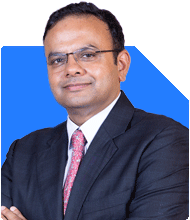Abhishek Dev | Answer |Ask -Follow
Financial Planner - Answered on Aug 29, 2023
A management graduate, he has over 21 years of experience in asset and wealth management.
He has been associated with reputed companies like HSBC GAM (India, south east Asia), PGIM, AMC, AMEX Bank, HDFC AMC and UTI in various roles, including leading business management, sales, marketing, product development and as a board member.... more

Hi, Currently I am investing Rs 15K/Month from last 6Years as SIP in 6 different pofilos and an overall return on it is approx: 150%. I would like a return of Rs 1Cr in next 10Years. Could you please suggest in which scheme and how much amount should I invest for achieving my goal?
You may like to see similar questions and answers below
Ramalingam Kalirajan |9309 Answers |Ask -Follow
Mutual Funds, Financial Planning Expert - Answered on Apr 01, 2024
Ramalingam Kalirajan |9309 Answers |Ask -Follow
Mutual Funds, Financial Planning Expert - Answered on May 26, 2024
Ramalingam Kalirajan |9309 Answers |Ask -Follow
Mutual Funds, Financial Planning Expert - Answered on Apr 15, 2024
Ramalingam Kalirajan |9309 Answers |Ask -Follow
Mutual Funds, Financial Planning Expert - Answered on Jul 30, 2024
Nayagam P P |7726 Answers |Ask -Follow
Career Counsellor - Answered on Jul 03, 2025
Nayagam P P |7726 Answers |Ask -Follow
Career Counsellor - Answered on Jul 03, 2025
Nayagam P P |7726 Answers |Ask -Follow
Career Counsellor - Answered on Jul 03, 2025
Nayagam P P |7726 Answers |Ask -Follow
Career Counsellor - Answered on Jul 03, 2025
Nayagam P P |7726 Answers |Ask -Follow
Career Counsellor - Answered on Jul 03, 2025
Nayagam P P |7726 Answers |Ask -Follow
Career Counsellor - Answered on Jul 03, 2025
Nayagam P P |7726 Answers |Ask -Follow
Career Counsellor - Answered on Jul 03, 2025
Nayagam P P |7726 Answers |Ask -Follow
Career Counsellor - Answered on Jul 03, 2025
Nayagam P P |7726 Answers |Ask -Follow
Career Counsellor - Answered on Jul 03, 2025
Nayagam P P |7726 Answers |Ask -Follow
Career Counsellor - Answered on Jul 03, 2025






















